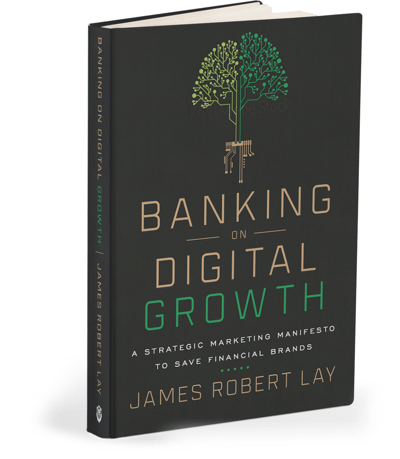“We have to get out of this mindset of looking at people as purely transactions. We’re in the business of building relationships.” -Jelaire Grillo
For too long people have considered it taboo to openly discuss their financial struggles, but that ends now. Not only should people not hide their financial burdens, but they should willingly and openly share their concerns. Encouraging people to open up about their struggles can positively influence their financial journey by helping them embrace financial education.
Jelaire Grillo, customer relationship manager at Prosperity Home Mortgage joined the Banking on Digital Growth Podcast to share her financial story and to empower others to share theirs. Jelaire is passionate about financial coaching to help both customers and financial companies maximize their growth potential.
Encouraging Openness About Financial Concerns
Encouraging people and customers to open up about their financial struggles is a tremendous growth opportunity for financial brands who can step in and guide them.
Unfortunately, it’s still considered taboo to talk about financial stress and financial struggles. Because of this, we often see customers making poor decisions because they are afraid to speak up and talk about their problems to get the help they need.
With financial coaching, however, brands can help destigmatize this notion that it’s not okay to be open about your financial problems. They can guide customers and educate them on their financial journey to help them achieve their goals. In turn, by putting the transformation of people over the commoditized transaction of dollars and cents, financial companies can experience significant growth.
Seeing Customers As More Than Just a Number
To encourage people to open up and share their stories so they can get the help they truly need, brands need to reconsider how they interact with their customers. Are you only getting to know your customers on a transactional basis, or are you genuinely getting to know them and their financial concerns?
Think about why customers are making certain decisions. Is there any part of the decision-making process that’s making them nervous? Is there anything holding them back? How can you help them move forward? These are all necessary questions, but unfortunately, they don’t get asked often enough.
As a result, customers don’t feel comfortable making big financial decisions, or they make big decisions without fully understanding the consequences.
Studies show that 85% of people in the United States feel some sort of financial stress, and one out of every three people you know is losing sleep because of their financial concerns.
This means there is a tremendous opportunity for financial brands to step in and help alleviate that stress and those concerns. Financial coaching can help people become more financially literate, but it can also help brands achieve greater success as well.
Sharing Our Stories to Improve Financial Literacy
For Jelaire, her journey to becoming more financially literate and a financial coach herself started with opening up about her struggles. Before she decided to work with a financial coach, she was in a position where she was scared to make purchases, worrying that the money wouldn’t be there tomorrow if she spent too much on X, Y, Z today. She relates these fears to her childhood, as many do, and that question of “What if I wake up tomorrow and it’s all gone?”
She knew that this wasn’t sustainable, however—always being anxious about spending money. So she took the initiative to find someone to help her. She made herself vulnerable and opened up to her financial coach. “He knows everything about me,” she said. “He knows what holds me back. He knows what triggers me. From there, he’s able to develop a plan to help me succeed in my money journey.”
It started with small baby steps until she found herself in a place where she could spend money and feel okay about it. Getting to that point, a place where you feel safe and comfortable making financial decisions, is all about accountability and having someone to share your concerns with and walk that journey with you.
This is where financial coaching comes in. A financial coach can listen to the customer’s concerns and help you meet their goals, but it’s ultimately about letting the customer be in control. It’s about educating them and supporting them in their journey, about encouraging them to open up about their financial struggles and their money story, but also letting them be the ones to make the decisions.
This creates a sense of agency. It gives people confidence that they can do this—it helps them gain back a sense of control and ownership over their financial journey.
Adopting a Financial Coaching Mindset Through Empathy
Financial companies must start getting out of this mindset that people are just transactions. Helping people make better financial decisions and growing your business is all about having more empathy and genuinely getting to know your customers. Success isn’t achieved through transactions; it’s achieved by building relationships.
Empathy allows people to feel comfortable opening up. It shows them that you genuinely care and are there to help them, which in turn will encourage them to become more financially literate and confident. By offering empathetic financial coaching, financial brands can gain a competitive advantage in this digital world where people are starved for connection.
The key to creating a safe space where customers feel they can open up is to stop making it seem so taboo to share financial struggles. Financial companies need to be willing to sit down with their clients and ask the hard questions. They need to be able to ask someone what their struggles are and, in turn, be open and empathetic towards the responses they get.
How to Bring Financial Coaching into Your Company
A company full of financial coaches is not achieved overnight. It’s about starting small with one person, one champion. You have to find one successful person in the company who shares this mindset, who loves the idea of where this could take your business. Find that one person who can make an impact, and from there, you can start moving up.
Find a champion, collaborate with them, connect with them, and then bring that knowledge, education, and passion to another person, and then another, and then another. Before you know it, you’ll have really good momentum and have made a lot of progress internally which can then be shared externally.
This article was originally published on March 2, 2022. All content © 2024 by Digital Growth Institute and may not be reproduced by any means without permission.




